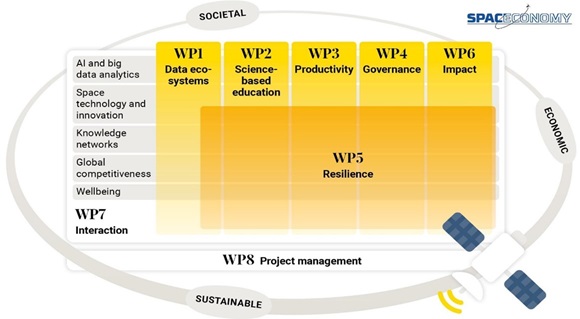
Advancing Sustainable Economic Growth through Space
“With the SPACECONOMY project, we want to ensure that space-based solutions support the well-being of our entire society, accelerate sustainable growth and strengthen Finland’s resilience in the face of future challenges - making the space sector more visible in Finland.” says consortium’s coordinator Heidi Kuusniemi from Tampere University.
SPACECONOMY positions Finland as a global forerunner in the rapidly expanding space economy by advancing innovation, sustainability, resilience and responsible science. The project supports Finland’s strategic objective of becoming the most attractive space activity environment in the world by 2030. It ensures that space-based assets contribute to national welfare, regional cohesion, digital sovereignty and climate goals while strengthening Finland’s international competitiveness and technological leadership.
The space economy, as defined by the OECD, encompasses “the full range of activities and the use of resources that create value and benefits to human beings in the course of exploring, researching, understanding, managing, and utilising space.” Satellite technologies, particularly Earth Observation (EO) and Global Navigation Satellite Systems (GNSS), are increasingly central to addressing critical societal challenges such as environmental monitoring, navigation, connectivity, crisis response and resilient infrastructure. These capabilities also unlock transformative opportunities for digital transformation, productivity growth, and welfare enhancement.
Finland has capitalized on the global rise of the commercial “New Space” sector through early investments, agile funding instruments and strong academic capacity. However, rapid private-sector growth has outpaced the ability of public and academic institutions to scale in support of science-based decision-making, long-term capability development and cross-sector coordination. Fragmented efforts, workforce shortages and limited integration of societal perspectives risk undermining future competitiveness.

SPACECONOMY directly responds to these challenges by building an inclusive, future-oriented and research-driven innovation ecosystem that unites academia, industry, public authorities and citizens. Our multidisciplinary consortium integrates deep expertise in space technologies, artificial intelligence (AI), economics, sustainability, governance and social sciences. Together, these capabilities will be harnessed to support evidence-based policymaking, strategic autonomy and regional development across Finland. The project focuses on four interconnected research themes:
- Developing AI-powered tools and automated processing chains for EO and GNSS data to support efficient decision-making, innovation, welfare and service delivery
- Designing socially and environmentally sustainable business and governance models for Finland’s space economy
- Fostering international partnerships for competitiveness, market access & scientific excellence
- Advancing resilient regulatory and ethical frameworks, especially for dual-use technologies, to maintain public trust and ensure democratic governance
SPACECONOMY will also address the growing workforce challenge in the space sector. A shortage of skilled professionals and awareness of career pathways hinders national capacity. To tackle this, the project includes educational pilots, living labs, and co-creation processes in collaboration with e.g. schools, universities and municipalities. These initiatives aim to inspire future professionals, promote space literacy and equip society with interdisciplinary skills needed for a resilient, space-enabled economy. SPACECONOMY will deliver:
- A national roadmap for sustainable and inclusive growth in Finland’s space economy
- Strategies to boost productivity, resilience, and competitiveness using satellite data and AI
- Policy recommendations for innovation ecosystems across key sectors
- Foresight-based risk mitigation for geopolitics, supply chains, and space infrastructure
- Insights to strengthen welfare, empower SMEs, and support regional smart specialization
- Improved early warning systems and societal resilience via AI-enhanced analytics
- Public engagement, education, and citizen science to build trust and foster innovation
Through interdisciplinary collaboration, stakeholder co-creation and the ethical and responsible use of AI, SPACECONOMY will enhance Finland’s global standing, reinforce national resilience and lead the next wave of sustainable, inclusive growth in the space economy. This experienced consortium has already played a central role in shaping Finland’s “New Space” transformation. SPACECONOMY is ideally positioned to deliver long-term impact for society, economy and the environment ensuring that space-based innovations serve not just markets, but people & planet.
Consortium: the SPACECONOMY consortium includes teams from Tampere University (coordinator, Heidi Kuusniemi et al), University of Vaasa (Helka Kalliomäki et al), Finnish Meteorological Institute (Jouni Pulliainen et al), University of Helsinki (Minna Palmroth et al), Aalto University (Jaan Praks et al), University of Turku (Marikka Heikkilä et al), the National Land Survey of Finland (Hannu Koivula et al), and Kupla Productions Ltd (Jari Mäkinen). Project duration: first funding period October 1, 2025 – September 30, 2028 (~3 Meur), and an option for a second period October 1, 2028 – September 30, 2031 (~3 Meur). Funding organisation: Research Council of Finland, Strategic Research Council
|
(Photo of Heidi Kuusniemi: Tampere University)






